Faculty awarded $1M in Neuroscience Collaborative grants
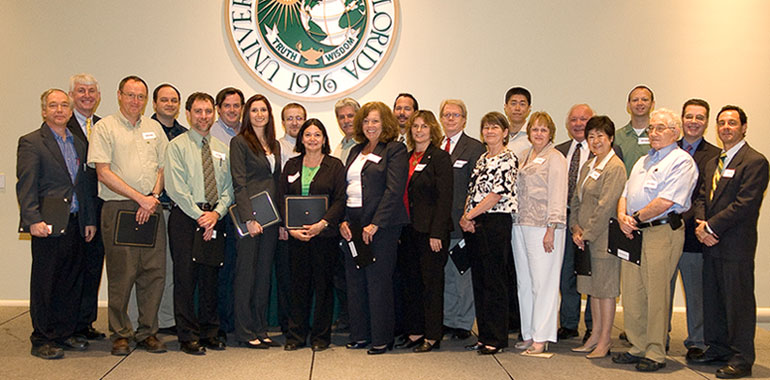
Grant recipients represented a wide range of neuroscientists across the USF campus.
A study replicating the hand motions of concert pianists through robotic modeling that may identify the biomechanical factors contributing to hand injury. A project investigating whether aerobic exercise can alleviate the effects of nicotine withdrawal. Development of a beside “brain computer” intended to help improve communication for patients with amyotrophic lateral sclerosis.
These were just a few of the 13 intramural grants presented to faculty in the USF Neuroscience Collaborative at the Collaborative’s first awards luncheon April 28 in the USF Marshall Student Center. The grants were funded by $1 million in seed money provided by Stephen Klasko, MD, MBA, CEO for USF Health and dean of the College of Medicine, and Provost Ralph Wilcox, PhD, USF executive vice president.
Clifton Gooch, MD, and David Diamond, PhD, directors of the USF Neuroscience Collaborative, announced the grant recipients (see list of winners below). The Collaborative, now nearly 300 members strong, was established two years ago to accelerate progress in USF neuroscience research by encouraging the creation, development and support of translational research.
Neuroscience is one of the university’s three signature research programs, along with Diabetes and Autoimmune Disorders and Sustainable Communities.
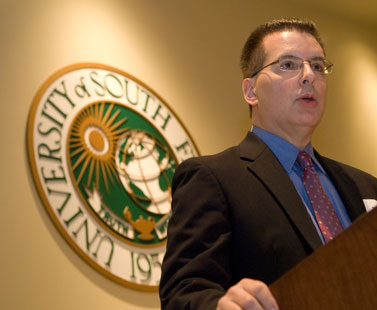
The Neuroscience Collaborative is directed by Clifton Gooch, MD,
(above) of the College of Medicine, and David Diamond, PhD,
(below) of the College of Arts and Sciences.
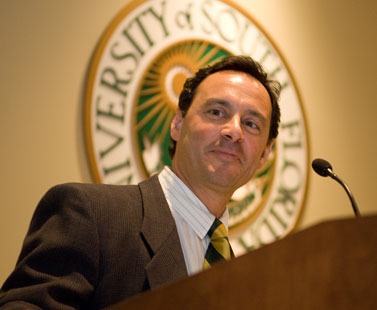
“The competition for these awards was quite stiff and we were very pleased with the quantity and quality of the proposals,” said Dr. Gooch, chair of neurology at USF Health. “They represent an excellent breadth of translational research from many domains of neuroscience across the university.”
To assure the integrity and credibility of the selection process, the Collaborative contracted with an outside agency — The American Association for the Advancement of Science (AAAS) – to handle the highly competitive grant review process. The AAAS selected three distinguished researchers in the appropriate fields to review each of the 73 submitted proposals.
Of the grants submitted, 52 percent were from the College of Medicine, 18 percent from Arts & Sciences, 11 percent from Engineering and 19 percent from other colleges (including Nursing and Public Health).
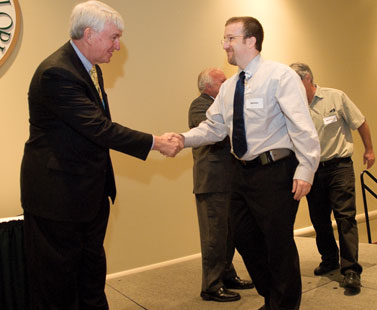
USF Provost Ralph Wilcox, PhD, (left) congratulates one of the grant recipients.
All the grants selected included two principal investigators who were new collaborators from different departments and/or colleges. For example, the innovative project involving robotic modeling of skilled hand tasks, like playing piano, pairs a researcher from the School of Music with another from the Department of Computer Science.
“This is a great start to a powerful, sustainable research initiative,” said Provost Wilcox. “It’s our expectation that these award recipients and all the others who put so much work into developing collaborative research proposals will be successful in moving to the next step – applying for competitive federal funding.”
The Neuroscience Collaborative is facilitated by the USF Health Center for Transformation and Innovation (CTI). For more information, visit www.cti-usf.com
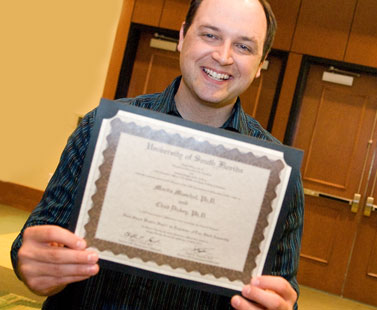
Chad Dickey, PhD, of Molecular Medicine, collaborating with
Martin Muschol, PhD, of Physics, shows off his winning grant certificate.
2009-2010 USF NEUROSCIENCE COLLABORATIVE GRANT AWARDS
PRIMARY CLUSTERS ($50,000/year for two years)
• Aging — Dr. Brent Small, School of Aging Studies, College of Behavioral & Community Sciences, and Dr. Paula Bickford, Center of Excellence for Aging & Brain Repair, College of Medicine; Nutraceutical Effects on Delay Eyeblink Conditioning in Humans.
• Alzheimer’s Disease — Dr. Martin Muschol, Physics, College of Arts and Sciences, and Dr. Chad Dickey, Molecular Medicine, College of Medicine; Heat-Shock Complex Effects on Aggregation Kinetics and Tau.
• Mood Disorders and Addiction — Dr. David Drobes, Oncologic Sciences & Psychology, College of Medicine, and Dr. Marcus Kilpatrick, Exercise Science, School of Physical Education; Aerobic Exercise and Nicotine Withdrawal.
• Movement Disorders — Dr. Sang-Hie Lee, School of Music, College of Arts and Sciences, and Dr. Yu Sun, Computer Science, College of Engineering; Robotics Modeling of Skilled Hand Tasks.
• Post-Traumatic Stress Disorder/Traumatic Brain Injury — Dr. Edwin Weeber, Molecular Pharmacology and Physiology, College of Medicine, and Dr. Stephen Saddow, Electrical Engineering, College of Engineering; Development of a Cubic Silicon Carbide Brain Machine Interface.
• Stroke – Dr. David Decker, Neurology, College of Medicine, and Dr. Keith Pennypacker, Molecular Pharmacology and Physiology, College of Medicine; Optimal Timing and Dosing of Therapy for Cerebral Edema after Stroke.
SECONDARY CLUSTERS ($50,000/year for two years)
• Dr. Hamisu Salihu, Epidemiology, College of Public Health, and Dr. Lewis Rubin, Pediatrics, College of Medicine; Genetic/epigenetic programming of human fetal brain by tobacco smoke.
• Dr. Niketa Patel, Molecular Medicine, College of Medicine, and Dr. Mildred Acevedo-Duncan, Chemistry, College of Arts & Sciences; Interactions of cdk7 spliced variants with PKC-iota during glioma cell cycle/proliferation.
COLLABORATIVE WORKSHOP/SYMPOSIA GRANT ($25,000 per workshop, one-time award)
• Dr. Huntington Potter, Molecular Medicine, College of Medicine, and Dr. Ranjan Duara, Neurology, College of Medicine; Symposium on Early Alzheimer’s Disease.
• Dr. Ana Mieres, School of Physical Therapy & Rehabilitation Sciences, College of Medicine, and Dr. Bobbie Vaughn, Department of Child and Family Studies, Florida Mental Health Institute, College of Behavioral & Community Sciences; Establishing Autism Spectrum Disorder Networks.
USF-VA COLLABORATIVE GRANTS ($25,000/year for two years)
• Dr. Emanuel Donchin, Psychology, College of Arts and Sciences, and Dr. Jeffrey Harrow, Spinal Cord Injury, James A. Haley Veterans’ Hospital; Development of a Bedside P300 Brain Computer Interface.
• Dr. Lynn Wecker, Molecular Pharmocology and Physiology, College of Medicine, and Dr. Bruce Citron, Bay Pines VA Health System, Anti-apoptotic effects of nicotinic agonists.
YOUNG INVESTIGATOR COLLABORATIVE GRANT ($50,000/year for two years)
• Dr. Eva Kimonis, Department of Mental Health Law and Policy, Florida Mental Health Institute, College of Behavioral & Community Sciences, and Dr. Maureen Groer, College of Nursing; Subtypes of Callous-Unemotional Traits in “Cross-Over” Youth.
Story by Anne DeLotto Baier and photos by Eric Younghans, USF Health Communications

